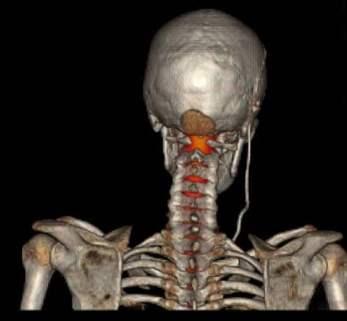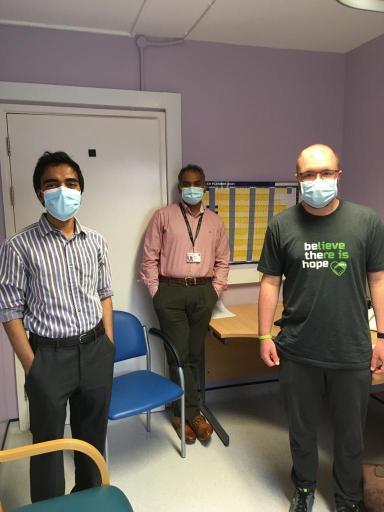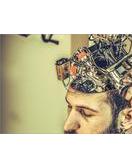Did they work the first-time round?
It had been tough for me to tell if the first course of nerve blockers (Greater Occipital Nerve Block) worked now that a few weeks had gone by. I kept quite an extensive log of the ‘brain zaps’; however, my general prognosis was that they were milder and less frequent. I hadn’t had as many severe episodes of ‘brain zaps’ to the point of which I had been totally incapacitated and unable to move my head. That can only be a good thing, right? So, I thought it would probably be worth having a second series of injections.
Rookwood Hospital for the Last Time
I found out from an earlier appointment which I’d been to at Rookwood; the hospital is due to be demolished, and all the services moved to another nearby hospital.
Rookwood was built in 1866 and originally was a house; years later, it was converted into a hospital.
The place is now falling apart, so it will be good for the services to be moved to a newer building. I didn’t expect to be going to this hospital again, but I’m pretty certain it will be the last time. A newspaper article from 2018 said it was due to be knocked down, but the pandemic has put that on hold.
What to Expect?
As usual, I had a list of questions ready to ask my neurosurgeon, George. I really wanted to emphasize about trying neuropathic pain killers, as I hadn’t tried them since I started getting the ‘brain zaps’ at the back of my head. I also wanted to ask other things, such as applying to get my driving license back.
The Appointment?
My mom drove me to the hospital, and we got there around 10:30am, ready for the appointment at 11am. This time we managed to get a parking space right near the entrance, which was a nice change. Like every other hospital appointment these days, it was sign in, temperature check and the usual questions asking if we had any covid symptoms. The staff from the University Hospital of Wales (where the clinics are usually held) were running the outpatient’s clinic, and a few of them came to say ‘hi’. Once signed in, we sat in the waiting area and waited for my surgeon George to call us in.
George, and his neurosurgery registrar, Harsh, came and called my mom and me into the room for my consultation. George jokingly said he was becoming very attached to me after 4 years and many operations, then apologised and said he is married whilst holding his ring finger in the air. He asked me how I had been and if I felt the need to have a second series of nerve blockers at this present appointment. I wasn’t quite expecting him to ask me that and just assumed that I would have the injections regardless. I explained I was relatively convinced that the brain zaps were better. I hadn’t had episodes to the point at which I was unable to function, and they were also less frequent. When exercising before having the first series of nerve blockers, I often had to stop what I was doing and lie down because the ‘brain zaps’ were so severe and incapacitating. Following this, we mutually decided to hold off the injections until the symptoms flare up again. The point of this is to give us an indication of how often I will need the nerve blocker injections topped up.
Hydrocephalus and Intracranial Pressure Issues
Alongside superficial siderosis, I also suffer from hydrocephalus which literally translates into Water on the Brain. This can be caused by an obstruction in CSF flow (cerebrospinal fluid), as it appears in my case. I underwent an ETV (endoscopic third ventriculostomy) in 2019, where a hole is made in the third ventricle of the brain so that the CSF can drain through the basal cisterns, which in turn turns relieves the pressure when it gets too high. I asked George if I had aqueduct stenosis, which is the narrowing of the aqueduct in the brain and can obstruct the flow of CSF drainage. George pulled up my MRI scan on the computer, zoomed in on the aqueduct and pointed to the hemosiderin (iron) deposits from the superficial siderosis. I had a feeling the hemosiderin may have caused an issue with the CSF flow, but I had now seen it on my MRI scan.
George showed me the poster that he, Harsh and two of their colleagues had put together for EANS Dublin 2019. They had presented on their insertion of a PEEK implant to repair the pseudomeningocele and cavity at the back of my head. At the end of 2018, when I was in the anaesthetic room waiting to go in for the operation, George asked for my permission to take some photographs during the procedure (which I consented to). The e-poster displayed a 3D video of the post-operative Indium-111-DTPA cisternogram, which I underwent to see if the CSF leak at the back of my head had been resolved. The scan showed that there is now no leak.

Driving Licence
I really wanted to ask George if he would be happy to sign me off so that I can drive again. Now that I’ve moved to a more rural area, I feel pretty isolated and think it would be safer for me to drive rather than rely on public transport to get about. As well as that, where I live, there’s only a bus every 2 and a half hours, so it would be tough to get from place to place.
George was happy for me to apply for my license now that I am more stable, particularly regarding the pressure in my head. He recommended that I drive an automatic car, so it is easier on the muscles in my legs. He asked about my vision, to which I told him that with glasses on, my eyesight is satisfactory, and my double vision is fully rectified. I don’t really take my glasses off anyway, but I wouldn’t have even considered driving without them on. Overall, he was happy for me to make an application to get my license back and said he would await correspondence from the DVLA (Driver and Vehicle Licencing Agency).
Neuropathic Painkillers
I also asked George about trying neuropathic pain killers. It was something that I’d been thinking about for a while. Although the ‘brain zaps’ had lessened, I wanted to ask his opinion. George said he felt that if the ‘brain zaps’ are milder and less frequent, there would be no point in introducing other medication such as ‘pregabalin or gabapentin, which can have their own side effects. I completely agreed with this statement. However, I know that if, or more than likely, when I get a flare-up in the ‘brain zaps’, it may be something worth asking again if the next set of nerve blockers have little to no effect.
George told me he was glad that he referred me to Mr Edwards in Bristol because when you are focussing on one thing, there is sometimes something you miss. Due to the number of operations I have had at the back of my head, it is no surprise that I am getting some sort of neuralgia which can be triggered by pressure or inflammation on the nerves.
Spreading the Word about the SSRA
I told George and Harsh about the blogs that I am writing for living with SS and wrote down the web address so they could have a look. I described to George about the day I had in London a few weeks ago. I took part in audio-vestibular research and said I was planning to get a few photos of the nerve blocker injections for a new blog. However, as that didn’t happen, Harsh, George and I had a photo anyway.


